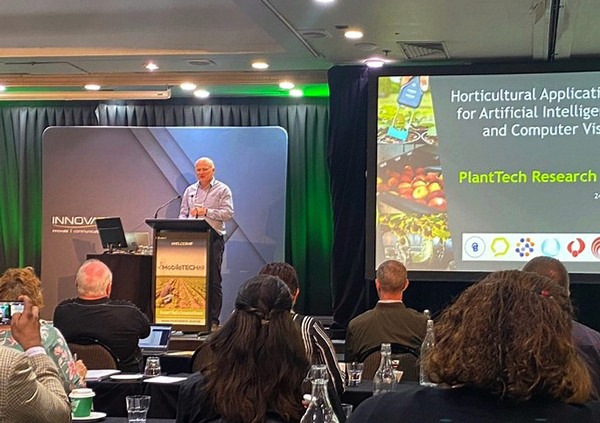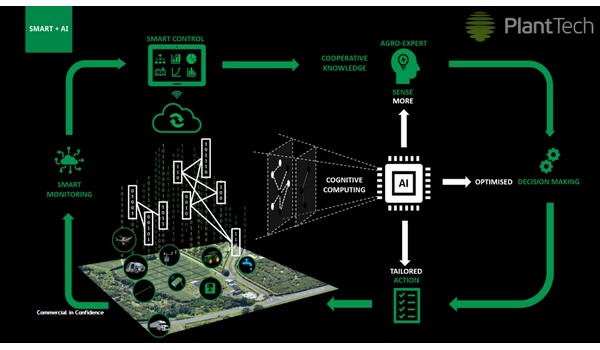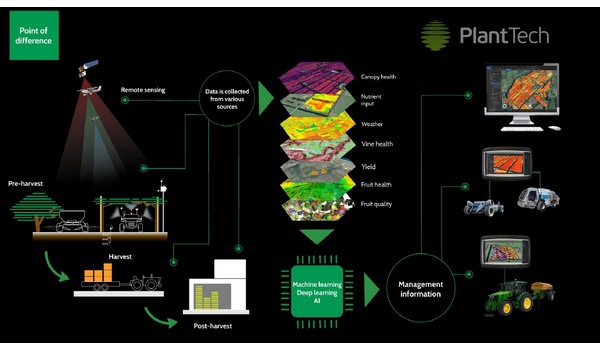Introducing Artificial Intelligence (AI) technology into fruit and vegetable growing operations, and making sense of all the data that exists, takes an 'all of industry' approach rather than a purely scientific one, according to a leading New Zealand-based research and development organisation.
PlantTech Research Institute Limited, Research Director Ian Yule told the recent MobileTECH Ag conference in Rotorua that the horticulture sector has a lot of data "raining down from different sources", and his company is trying to add AI, with the aim of unravelling what it actually means to ultimately provide more value to growers.

Photo: Ian Yule presenting at MobileTECH Ag (courtesy of PlantTech Facebook)
"The whole idea is to develop a whole of industry data provision; so, we have a plane up in the air now that will collect 180 billion data points," he said. "We have drones up in the air right now getting more data. We have companies involved with us collecting data from the orchard, like crop counting. We are looking at weather information. Then we go onto harvest and people like Radfords have a lot of information about what is happening post-harvest. Every kiwifruit, for example, is put through a grader and there is information on every piece of fruit. So, we can then use that information to solve problems across the industry and help get management information out to industry."
The company is based in Tauranga, and Mr Yule says the focus is not about creating new technologies or sensors but use AI to better utilise the technologies that already exist. PlantTech currently has seven shareholders, and is a knowledge-service provider, creating systems that help its partners to "be more competitive", so that each can deliver the identification, maturing of valuable academic research, product integration and AI domain expertise.

Mr Yule added that the scale of the company's projects is also important in getting an overall understanding, with the need for regional focus right down to even an orchard, tree or fruit as a point for data collection.
"There are a number of sensors and remote sensing that can be used in that sort of environment," Mr Yule said. "The thing is to try and move it all together to create a more coherent data source for industry. We're asking what use can we make of satellite information? What use can we make of advanced systems on aircraft? Can we use that to train other systems? I feel that the gap is getting bigger between what the technology can do, and what we are able to do as researchers because we are still (tethered) to a domain expertise and trying to move into these other areas. One thing that I thought we needed to do was specialise."
PlantTech has three principal scientific focuses. The first is Computer Vision which focuses on faster, reliable and more accurate systems that not only count fruit, for example, but also sizes it at a fast pace. The second is Data Analytics, and working out the relationship of what is happening in the orchard to what is happening as the fruit is dispatched. The third is Bioinformatics, which takes and examines samples around environmental DNA and trying to understand plant and orchard Microbiome.

But Mr Yule highlighted the importance of putting it into a visual format, such as Geospatial Artificial Intelligence, in a way that is easily understood and able to be used for decision making.
"AI and computer vision are now being used in the horticultural industry," he said. "We are now surveying a significant part of the industry with different satellite systems, planes, drones and vehicles on the ground. We have other companies who gather data about what is happening about what the fruit is doing, and that's part of our research strategy. So, what is the value of doing all those things and how can we show the grower and guide them to grow more fruit? All these industries have unsatisfied demand, but we don't want to just keep expanding as we will run out of land. If we can get better-guided growing methods on the land we have and increase crop yields and quality, we believe that is a better solution."
For more information
Ian Yule
PlantTech Research Institute Limited
Phone: +64 7 571 0226
ian@pri.co.nz
www.planttechresearch.com
